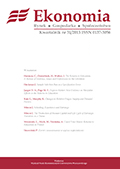Wprowadzenie. Polska i Niemcy: dwa podejścia do reformy systemu emerytalnego
G. Kula
ABSTRACT:
Full text (PDF)
Issue number: 28
In this issue:
Polska i Niemcy — porównanie systemów i reform emerytalnych obu krajów
A. Ruzik-Sierdzińska
ABSTRACT |
PDF
Aim of the following paper was to compare changes in the German and Polish pension systems caused by demographic and labour market trends observed in recent decades. Since 1990s, those changes were similar in two systems although ways to reach the goal differed. Both countries have obligatory public components of the pension system. There are also so called second pillars, i.e. employees pension plans in Germany and obligatory open pension funds in Poland. Then, there exists the third pillar—voluntary savings for the old age—linked to tax exemptions or subsidies. The result of the described reforms aremore favourable forecasts of the financial stability of both pension systems. Another one is also future (and already observed in Germany) increase in the effective retirement age and employment rate of older workers.
Wyzwania dla polityki społeczno-gospodarczej w Niemczech i w Polsce na podstawie danych SHARE
M. Myck
ABSTRACT |
PDF
The paper compares a set of health and labour market outcomes for three populations from the Survey of Health, Ageing and Retirement in Europe (SHARE). We analyse differences between the Polish aged 50+ and the respective German population divided into those who prior to the unification in 1989 lived in the East and West Germany. In terms of most analysed outcomes we find a \"West-East gradient\" with the most favourable statistics found for the west German population and the worst for Poland. The unfavourable situation on the labour market in Poland goes along poor health and lifestyle outcomes on most measures, and it seems that employment and health-related policies should be designed in combination to address the problems. The East–West divide in Germany still seems to present a policy challenge. We find important differences in such outcomes as labour market arrangements and such health outcomes as incidence of high blood pressure and diabetes. The East–West gradient is also found in the so-called underused capacity, i.e. the proportion of healthy individuals aged 50–65 who are not employed. The main factor behind this in Poland is retirement, while the difference in Germany is largely caused by higher levels of unemployment in the east
Przyszłe emerytury a zmiany w historiach zarobkowych (analiza mikrosymulacyjna dla Niemiec)
J. Geyer, V. Steriner
ABSTRACT |
PDF
Basing on a microsimulation model, the integrated data-base from the German pension insurance and the German Socio-Economic Panel Study we analyze future pensions across cohorts born between 1937–71. The microsimulation model accounts for changes in the individuals\' earnings activities in the times of demographic changes in the context of the long-run pension reforms. We consider also the effects of increasing the statutory retirement age and decreasing the level of benefits resulting from the implementation of the sustainability factor (Nachhaltigkeitsfaktor). The outcomes of the simulations show that both the labor market developments since the unification and the recent pensions reform will have a significant impact on the level of retirement benefits, in particular those of younger cohorts. There are also clear differences between East and West Germany, between sexes and education levels. If the unfavorable tendencies present on the labor market since the unification are sustained, the level of future pensions among younger birth cohorts in East Germany will fall dramatically. However, even in the case of the more optimistic labor market scenario the overall negative trend in the evolution of pension benefits of the younger birth cohorts in Germany will be significantly weaker but not reversed.
Debata. Reformy systemów emerytalnych w Polsce i Niemczech — sukcesy, porażki i przyszłość
.
ABSTRACT |
PDF
The conference included a panel discussion during which we discussed achievements, failures and the future of pension system reforms in Poland and Germany. The main panelists were:
- Marek Góra, Warsaw School of Economics, co-author of the pension reform in Poland,
- Jeremi Mordasewicz, representative of The Polish Confederation of Private Employers at the ZUS Supervisory Board,
- Viktor Steiner, Freie Universität Berlin and DIW-Berlin.
According to our plans Edward Whitehouse, pension specialist in the Social Policy division, OECD was supposed to be the fourth panelist. Unfortunately, he was unable to reach Warsaw, due to the protests against the pension reform, which took place in France at that time. This is a good example that pension reforms are important not only for specialists and politicians, but also for ordinary citizens. The debate was moderated by Michał Myck, CenEA and DIW-Berlin. The transcript was smoothed out by Grzegorz Kula in order to preserve a style of the debate but at the same time.

